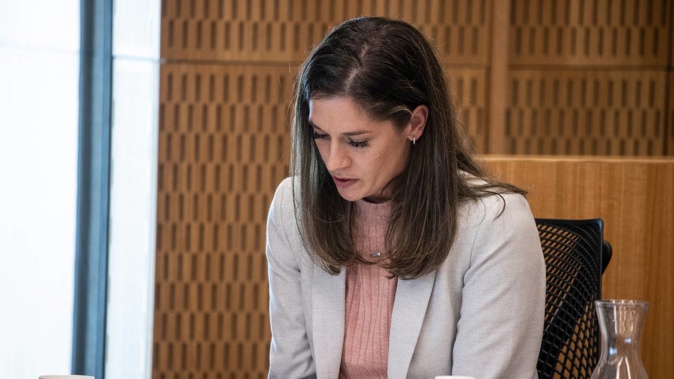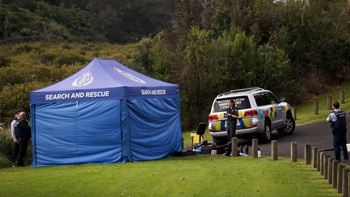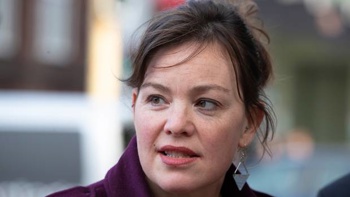
One of the young ''stars'' of the infamous television shows documenting life at Gloriavale says she often woke at 2am to get her work done and was made to feel "evil" when her husband became so unwell she had to care for him full time instead of "contributing" to the Christian community.
Pearl Valour also spoke of the moment she started to realise things were not all as they seemed and there was "dishonesty" going on within the under-fire sect.
Valour and her husband Paul became well known in New Zealand when their wedding featured in a documentary series about the West Coast sect that screened on TV2 in 2015.
The couple were in their early 20s when they married — a union arranged by the Gloriavale leaders.
/cloudfront-ap-southeast-2.images.arcpublishing.com/nzme/3OSZBJ5MYQS7GGQSCFE7VGR4CU.jpg)
The wedding of young couple Paul and Pearl Valour was captured on Gloriavale - Life and Death screened on TVNZ in 2015. Photo / Supplied TVNZ
The couple and their five young children left the community in November 2021 and now live in South Canterbury.
Valour is one of six women spearheading an Employment Court case against the leadership, known as "the shepherds".
Valour and Serenity Pilgrim, Anna Courage, Rose Standtrue, Crystal Loyal and Virginia Courage say they were effectively born into and kept in "servitude" - which is illegal in New Zealand - forced to work long days with no breaks and very little food or water.
The women will give evidence in a month-long Employment Court hearing where they are seeking a ruling that they were employees and not volunteers at Gloriavale.
Their case follows a similar action by a group of former Gloriavale men who the court ruled were employees from when they were just 6 years old, regularly undertaking "strenuous, difficult, and sometimes dangerous" work when they were still legally required to be at school.
Both the current and earlier cases followed multiple inquiries into the employment status of people living and working at Gloriavale.
- 'You don't oppose the shepherds': Court hears Gloriavale women kept in 'servitude'
- Gloriavale leaver says 15-hour work days with no breaks normal for girls, women
Today Valour gave lengthy evidence before Employment Court Chief Judge Christina Inglis in Christchurch.
/cloudfront-ap-southeast-2.images.arcpublishing.com/nzme/CMWIVRXVDZGB5KSQ4Q4VJLWIAI.jpg)
Pearl Valour speaking in the Employment Court about her time at Gloriavale. Photo / George Heard
She said she left school at 15 and started working - which initially she did not mind as she did not enjoy school.
However Valour soon learned that working at Gloriavale - for women - entailed long, hard and exhausting days.
She spoke of numerous teams that worked on cooking, cleaning, preparing food, washing and folding laundry, caring for children and said there was "a lot of pressure" to get everything done to avoid being "growled at" or "blown up" by the leaders and older women.
Valour said shepherds and senior women - would berate and scold the women if food was late, if things were forgotten, if girls were late or any other percievied failures.
While working in the kitchen Valour recalled times when just three women had to cook meals for the whole community totalling around 600 people.
One woman prepared the entire lunch while Valour and her sister - who was pregnant - made sandwiches.
The same woman then cooked dinner for the masses while the others did dishes.
Valour said that was very normal - as was being shamed and humiliated if anything went wrong, for example toast being overcooked.
"You are taught you wouldn't survive in the world … I felt like owed them," she explained.
"When I was first working there were no rules as to when you would get up to start work - I used to get up at 2am to make a good start on the day so I could have time off later in the day."
/cloudfront-ap-southeast-2.images.arcpublishing.com/nzme/FHSOTO6A53HT7OQNGSGKCXPZSY.jpg)
Pearl Valour when she appeared on the TVNZ documentary Gloriavale - Life and Death screened in August 2015. She has now left the community. Photo / Supplied TVNZ
Rules were later put in place and Valour said while leaders said it was to make sure the girls got enough sleep they came after it emerged one of them was involved with a man.
Valour said the rules meant there was less time for the girls to finish their long list of work during the day.
And even if they did finish, they were simply given more work to do.
"I hated that they put rules and restrictions on the girls but the boys were still able to do what they liked," said Valour.
Valour initially worked in the kitchen and for a time was a team leader.
She said it was a horrible place to work - hot with no ventilation and "hardly any windows".
Women spent all day working on a concrete floor which led to them having foot, leg and back pain.
They had to use cumbersome wood ovens and "got in trouble" if they used the electric oven.
"If the wood stove is hot you have to use that ... to save on power," she said.
The "frying room" had locks on the power switches to prevent the women from using some electric appliances without permission.
Valour said it would have made the womens' work much quicker and easier if they were allowed to use the appliances but the leaders refused.
"The fire girl would have to get up at 4am to get the (wood ovens) started and clean it ... using a sander ... the cleaning would take a while, and you'd want that hot by 5am," she said.
The wood ovens were also used to heat "pots of hot water for washing dishes" - hundreds of plates, utensils and cups that would all have to be dried by hand using tea towels.
Women were tasked with making bread, cheese, yoghurt, crackers and other food along with daily meals - porridge, roast dinners and thousands of sandwiches a week.
/cloudfront-ap-southeast-2.images.arcpublishing.com/nzme/TYP37DEVROTWTQ4BDLD6UZXPVE.jpg)
Newlyweds Paul and Pearl Valour after their wedding ceremony. Photo / Supplied TVNZ
Soon after the birth of her fifth child Valour said her husband became sick, having up to 10 seizures a day.
She said it was six months before she was "allowed to get him help".
She was then allowed to stop working to care for him.
Valour said as neither could "contribute" they were made to feel they were "living on charity" within Gloriavale.
They felt guilty and worried their community would think they were lazy or "evil".
One weekend when Valour left Gloriavale with her husband for a medical appointment she learned how much the community was receiving from the Government for her family.
She was shocked to learn how much the leaders were getting in tax credits and payments for each of her children.
"I felt like they stole this from under my nose," she said.
"We were made to feel like we had been living on charity ... I thought 'okay, there's a bit of dishonesty here'."
Valour's evidence continues this afternoon before Judge Inglis.
As she and others spoke in court against the community, current members sat in the back of the court listening.
Some laughed at the evidence given by the former members and others took and passed notes in court.
Earlier today Judge Inglis heard evidence from leaver Serenity Pilgrim and her father Isaac Pilgrim.
They spoke of the poor treatment of women at Gloriavale, harsh working conditions and the reasons they left the community.
/cloudfront-ap-southeast-2.images.arcpublishing.com/nzme/5PQYTEWIIJDFDCUJ5WXLZFMHQM.jpg)
Gloriavale leaver Serenity Pilgrim in court. Photo / George Heard
Yesterday leavers' lawyer Brian Henry said the case would expose the "dark" and "scandalous" reality of Gloriavale.
He said to put it simply, within the community women were expected to "scrub, cook and clean for the rest of their life" or be "pregnant for the rest of their life".
"They were under the control of the shepherds and had no freedom," he said.
"You don't oppose the shepherds ... you're out of unity if you don't just trot on and behave how you want them to."
Gloriavale lawyer Phillip Skelton QC said the community's leadership rejected all claims of servitude and forced labour.
He said the leavers were "embittered" and their accounts were "plainly untrue".
He has suggested to witnesses so far that their evidence is "exaggerated" and "inaccurate".
The case continues.
Take your Radio, Podcasts and Music with you









